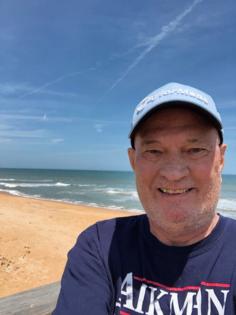Amgen plows ahead with costly, highly toxic cancer dosing despite FDA challenge
Published in News & Features
When doctors began using the drug sotorasib in 2021 with high expectations for its innovative approach to attacking lung cancer, retired medical technician Don Crosslin was an early beneficiary. Crosslin started the drug that July. His tumors shrank, then stabilized.
But while the drug has helped keep him alive, its side effects have gradually narrowed the confines of his life, said Crosslin, 76, who lives in Ocala, Florida: “My appetite has been minimal. I’m very weak. I walk my dogs and get around a bit, but I haven’t been able to golf since last July.”
He wonders whether he’d do better on a lower dose, “but I do what my oncologist tells me to do,” Crosslin said. Every day, he takes eight of the 120-milligram pills, sold under Amgen’s brand name Lumakras.
Crosslin’s concern lies at the heart of an FDA effort to make cancer drugs less toxic and more effective. Cancer drug trials are structured to promote high doses, which then become routine patient care. In the face of evidence that thousands of patients become so ill that they skip doses or stop taking the drugs — thereby risking resurgence of their cancers — the FDA has begun requiring companies to pinpoint the right dosage before they reach patients.
The initiative, Project Optimus, launched in 2021 just as Amgen was seeking to market sotorasib. At the time, the FDA’s leading cancer drug regulator, Richard Pazdur, co-authored an editorial in the New England Journal of Medicine that said Amgen’s trials of the $20,000-a-month drug were “hampered by a lack of robust dose exploration.”
The FDA conditionally approved sotorasib but required Amgen to conduct a study comparing the labeled dosage of 960 mg with a dosage of 240 mg. The trial, published in November, showed that the 960-mg dose may have given patients a month more of life, on average, but caused more severe side effects than the lower dose.
Amgen is keeping the 960-mg dosage as it conducts further tests to get final approval for the drug, spokesperson Elissa Snook said, adding that the dose showed superiority in one study. Whether medically justified or not, the heavier dosage allows the company to protect 75% of its revenue from the drug, which brought in nearly $200 million in the United States last year.
And there appears to be nothing the FDA can do about it.
“There’s a gap in FDA’s authority that results in patients getting excess doses of a drug at excess costs,” said Mark Ratain, a University of Chicago oncologist who has pushed for more accurate cancer drug dosing. “We should do something about this.”
Deciding on Dosage
...continued
©2024 KFF Health News. Distributed by Tribune Content Agency, LLC.







Comments